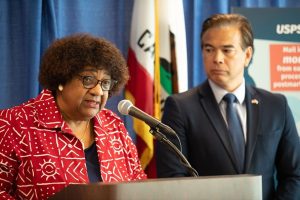 -Editorial
-Editorial
California Secretary of State Shirley Weber is calling on Californians to vote early and with confidence ahead of the upcoming election, emphasizing that accessibility, transparency, and trust remain at the heart of the state’s voting process.
Speaking during a virtual briefing with ethnic and community media, Weber thanked local journalists for their ongoing efforts to inform diverse audiences, calling them “a central piece of what we call the trusted messengers of these communities.”
Weber praised the partnership between her office and ethnic media outlets, noting that their outreach helps ensure all Californians — regardless of background or language — have accurate information about how to register, vote, and make their voices heard. “Voting is a precious experience,” Weber said. “For many people in this country, especially those who were once denied that right, voting represents power, dignity, and the promise of democracy.”
Reflecting on her family’s history, Weber shared how her parents, originally from the segregated South, were unable to register to vote until moving to California. “They came from a place where the barriers were not only legal but also cultural and violent,” she said. “Having your voice, having the ability to vote, and making it accessible to so many is really, really important.”
Weber said that more than 2.5 million Californians have already returned ballots, demonstrating strong voter engagement heading into the November 4 special election. She reminded residents that voter registration does not end once the deadline passes — same-day registration remains available at all voting locations through Election Day. “If you missed the deadline, you can still register and vote in California on the same day,” she said. “No one should ever feel left out of this process.”
California’s model of “more days and more ways” to vote continues to expand voter access. Under the state’s Voter’s Choice Act, most Californians can vote by mail, drop their ballots in secure drop boxes, or cast their vote in person at vote centers open up to 11 days before Election Day. Voters can also track their ballots through the “Where’s My Ballot?” service at WheresMyBallot.sos.ca.gov, which provides real-time updates on when ballots are mailed, received, and counted.
Weber also addressed misinformation circulating online about voting procedures and ballot design. She specifically dismissed false claims regarding the small holes in ballot envelopes. “Those little holes are not there so people can see how you voted,” she clarified. “They help visually impaired voters locate where to sign, and they assist election officials in processing ballots securely.”
The Secretary of State further reassured voters that California’s elections are protected by multiple layers of security, including paper ballots, post-election audits, and strict chain-of-custody procedures. “California has one of the most transparent and secure election systems in the nation,” Weber said. “Every ballot is tracked, verified, and counted with care.”
Weber also urged voters to be proactive in reporting any signs of voter intimidation or irregularities to her office or the state’s voter protection hotline at 1-800-345-VOTE. “We want people to feel secure in voting,” she said. “California is committed to making sure no one is intimidated, misinformed, or blocked from participating in our democracy.”
California voters will decide the fate of Proposition 50 in the Nov. 4 statewide special election, a constitutional amendment introduced by Gov. Gavin Newsom that would allow the Legislature to temporarily replace the state’s independently drawn congressional map with one of its own for the 2026, 2028, and 2030 elections.
A “yes” vote would implement the new, legislatively drawn map until after the 2030 census, when the California Citizens Redistricting Commission would resume its duties. A “no” vote would keep the current map—crafted by the independent commission—until new lines are drawn following the 2030 census. Supporters argue the measure helps California counter partisan redistricting efforts in other states, while opponents warn it gives politicians too much control over how districts are shaped.


